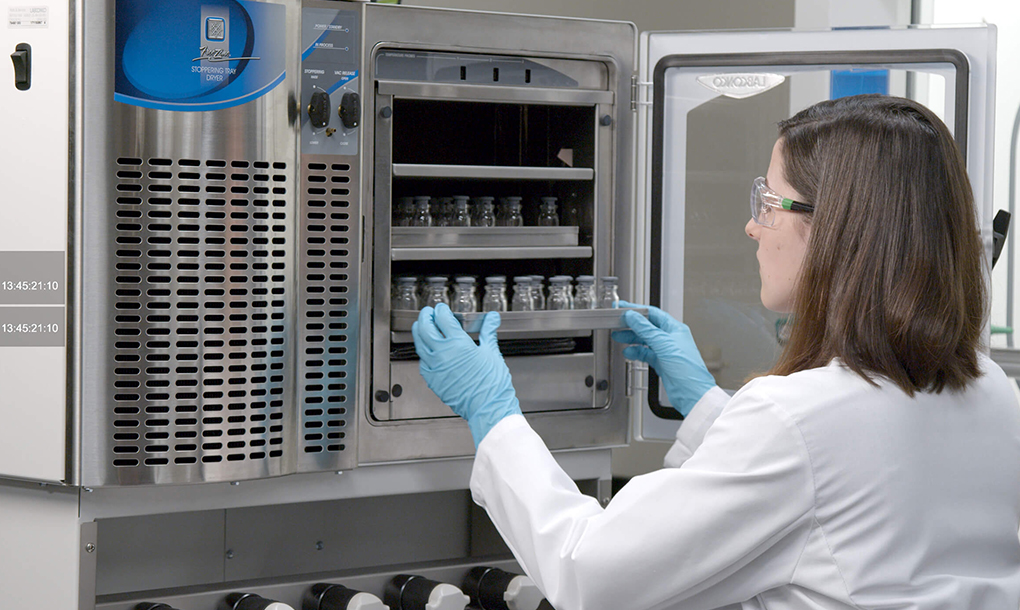
09 Feb
In the pharmaceutical industry, ensuring drug stability, effectiveness, and safety is paramount. A critical technology to achieve this is freeze-drying, also known as lyophilization. This process plays a significant role in preserving various pharmaceutical products, from vaccines to injectable drugs.
Freeze drying helps extend the shelf life of these products while maintaining their potency, making it an essential process in the industry. This blog will explore why freeze-drying is crucial to drug stability and how it benefits pharmaceutical manufacturers.
Freeze drying is a preservation technique that removes moisture from drugs without affecting their molecular structure. The process involves freezing the product and then using a vacuum to remove the ice through sublimation (directly converting solid ice into vapor). The result is a dry product that retains its shape, potency, and stability. For pharmaceutical applications, freeze-drying is especially important as it prevents the degradation of sensitive drugs that can be damaged by heat or moisture.
• Retention of Potency : Many drugs, including biologics and vaccines, are sensitive to temperature and moisture. Freeze drying ensures that these drugs retain their efficacy over time.
• Increased Shelf Life : By removing moisture, freeze drying prevents microbial growth and reduces chemical reactions, which leads to longer shelf life and fewer concerns about spoilage.
• Convenience in Transport and Storage : Freeze-dried drugs are lightweight and compact, making them easier and more cost-effective to store and transport, especially under controlled conditions.
For a deeper understanding of how freeze drying is critical to preserving pharmaceutical products, check out How Industrial Freeze Dryers Are Critical in Pharmaceutical Product Preservation.
Freeze drying is key in ensuring that pharmaceutical products remain potent, stable, and transportable, which is vital for manufacturers and consumers.
Freeze drying offers several advantages in pharmaceutical manufacturing, making it the preferred choice for drug preservation. Let's dive into some of the key benefits:
1. Preservation of Sensitive Drug Compounds : Many pharmaceutical compounds, such as proteins, enzymes, and vaccines, are sensitive to heat and moisture. Freeze drying removes moisture without high temperatures, ensuring these sensitive components remain intact. This process helps protect the structural integrity of the drug, preventing degradation.
2. Long-Term Storage Stability : Freeze-dried drugs have a much longer shelf life than non-lyophilized products. By removing moisture, freeze-drying reduces the risk of microbial contamination and chemical degradation. This means drugs can be stored for extended periods without losing potency, making them more reliable for long-term use.
3. Cost-Effective Shipping and Handling : Freeze-dried products are often lighter and more compact than their liquid counterparts, which can significantly reduce shipping and storage costs. In addition, freeze-dried drugs can be stored at room temperature, eliminating the need for expensive refrigeration or freezing during transport.
Learn more about the transformative impact of freeze drying on pharmaceutical supply chains in How Freeze Dryers Have Transformed the Pharmaceutical Supply Chain.
Freeze drying offers numerous advantages, including preserving sensitive drug compounds, extended storage stability, and cost-effective shipping and handling.
The process of freeze-drying for pharmaceutical products involves a delicate balance of temperature, pressure, and time. Let's look at the key steps involved:
1. Freezing : The drug product is frozen to a temperature that turns water into ice. This step is crucial to preserving the structure of the active ingredients.
2. Primary Drying(Sublimation) : During primary drying, the pressure is lowered in a vacuum chamber, allowing the ice to sublimate or turn directly from a solid to a gas. This step removes the majority of the moisture content without melting the drug.
3. Secondary Drying(Desorption) : Once most of the moisture has been removed, secondary drying removes any residual moisture. This ensures that the drug is as dry as possible and ready for storage.
Each stage of the freeze-drying process is carefully controlled to ensure the stability and quality of the final product. Using specialized commercial lyophilizers allows manufacturers to produce high-quality, stable products that meet rigorous standards.
For more details on the advantages of commercial lyophilizers in pharmaceutical manufacturing, check out The Advantages of Using Commercial Lyophilizers for Pharmaceutical Manufacturing.
The freeze-drying process is a highly controlled sequence of steps that ensures pharmaceutical products maintain their quality and stability throughout production and storage.
Freeze drying also plays an essential role in biotechnology, which overlaps significantly with pharmaceutical production. Biopharmaceuticals, such as vaccines, monoclonal antibodies, and gene therapies, rely heavily on freeze-drying to preserve their active ingredients. The process helps protect the molecular structure of biologics and ensures they maintain their functionality.
Biotechnology products are often large, complex molecules that are especially sensitive to heat, which makes freeze-drying a crucial method for ensuring their stability. By removing moisture and preventing degradation, freeze-drying allows biotechnology companies to produce safe, effective drugs that can be distributed globally.
To explore the specific role of freeze dryers in biotechnology, read more in Exploring the Role of Freeze Dryers in the Biotechnology Industry.
Freeze drying is a cornerstone technology in biotechnology, enabling the stable preservation of biologics and other sensitive pharmaceutical products.
Freeze-drying is not just a preservation method—it is a crucial technology for ensuring pharmaceutical products' stability, efficacy, and safety. Freeze-drying offers a reliable solution for maintaining product integrity, whether working with vaccines, biologics, or other sensitive drugs.
If you want to incorporate freeze-drying into your pharmaceutical manufacturing process,contact us today to learn more about our state-of-the-art solutions.